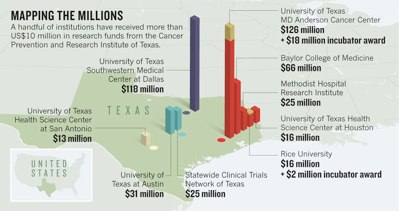 (Paul J. Webber, Associated Press)
(Paul J. Webber, Associated Press)
AUSTIN – At least seven scientists resigned in protest this week from Texas’ embattled $3 billion cancer-fighting program, claiming the agency created with the backing of the governor and cancer survivor Lance Armstrong is charting a new “politically-driven” path that puts commercial interests before science.
The Cancer Prevention and Research Institute of Texas has awarded nearly $700 million in grants since 2009, making Texas home to the nation’s biggest pot of cancer-research dollars behind only the federal National Institutes of Health. But how the state agency picks projects has fallen under intensifying scrutiny, beginning in May when its chief scientific officer resigned in protest after it approved — without scientific review — a $20 million commercialization project.
Nobel laureate Dr. Phillip Sharp was among those stepping down this week, writing in his resignation letter that the CPRI is making funding decisions that carry a “suspicion of favoritism” in how the state is handing out taxpayer dollars. Dr. Bryan Dynlacht, another reviewer who’s leaving, warned that the agency was headed down a path of systematic abuses.

“You may find that it was not worth subverting the entire scientific enterprise — and my understanding was that the intended goal of CPRIT was to fund the best cancer research in Texas — on account of this ostensibly new, politically driven, commercialization-based mission,” Dynlacht wrote in his letter.
Commercialization projects focus on turning research into drugs or other sellable products rather than funding the research itself.
The letters were obtained by The Associated Press through an open records request. Sharp is professor at the Koch Institute for Integrative Cancer Research at the Massachusetts Institute of Technology, while Dynlacht is at the New York University School of Medicine.
(Read the full story at Houston Chronicle)
LOCAL AREA HEADLINES:
- Neighbors dispute police account of fatal HPD shooting (Houston Chronicle)
- 3rd Annual Summit On Human Trafficking, Are We Winning The Fight? (KUHF Public Radio)
- Donation account created for boy kept in box (Galveston Daily News)
- Family: Service dog for diabetic child fails at job (KHOU 11 News)
- Laugh to save missing children (KRIV 26 News)
- Business owner gets 30 months in prison for health care fraud (KRIV 26 News)
- Houston vet shocked at VA’s threat (KRIV 26 News)
- Trees For Houston … ISD (KUHF Public Radio)
STATE, NATION & WORLD
- State board of education election seen as clash of culture, values (Houston Chronicle)
- Birdwell to Renew Fight Against In-State Tuition Policy (Texas Tribune)
- New Orleans Limits Hurricane-Themed Excursions (New York Times)
- Romney’s Pledge Puts Focus on Public TV (New York Times)
- Cross in the Closet: Straight Christian Lives a Year as Gay Man (ABC News)
- Expect small 2013 Social Security benefit increase (AP)
- At CDC, Scientists Fight to Halt a Deadly Outbreak (New Yorke Times)
- Human Rights Watch: Assad forces using cluster bombs in Syria war (AlertNet/Reuters)
